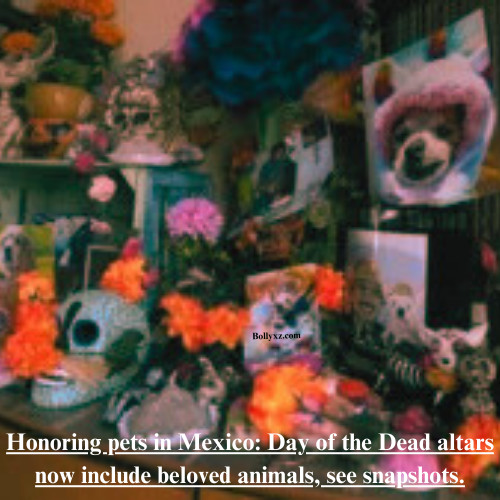Pets are now commemorated on Mexico’s Day of the Dead with altars adorned with flowers, candles, and photographs, reflecting the bond and developing lifestyle of these beloved animals in family memories.
The festive and colorful celebration of the Day of the Dead has given way to an increasing recognition of pets as family members who will share a space on the last refuge of long-passed human family members- along with the deceased ones. Thus, this celebration, centered on honoring the majority of departed human family relations, gives homage to loveable pets who had unique places in full-hearted, happy lives that bridged humanity with the animal world.
The inclusion of animals in such observations demonstrates a shift in the very meaning of how Mexican people celebrate the Day of the Dead. In the past, that more or less meant just celebrating deceased relatives, whereas nowadays, Mexican families perform and celebrate the holiday in a much more inclusive way, introducing pets into their celebrations. This represents a paradigm shift into a very old historical appreciation of animals since the pre-Hispanic culture of Mexico. These Indigenous peoples of Mexico worshiped several animals, especially small, hairless bugs of the Xoloitzcuintli, which were believed to serve as guides into the world of the afterlife. Therefore, they were often buried with their human companions or honored in art as synonymous with loyalty and guidance.
Life A Special Day With Pets
Pet memorials have blossomed into a dedicated day for animals: November 27. The National Institute of Anthropology and Registration is even giving tips on how to build pet altars, recommending methods for them to be recognized by life-size objects. That illustrates an increasing feeling that, at the very least, pets like any other member of the family were deserving of remembrance.
The Day of the Dead begins on October 31 with tributes to people who died from injuries, continues on November 1 for children who died young and concludes on November 2 for adults. Families gather to smooth over graves and decorate them with bright orange flowers, called cempasúchil, candles, and offerings of their favorite ingredients. In recent years, many families have accelerated those customs to include pets, who now have their little place on altars.
For Meztli Lizaola, a photography designer in Mexico City, honoring her late Chihuahua, Taco, has become an important part of her family’s celebrations. Each year, she places an urn with Taco’s ashes and a photo of him on a small table in her living room, next to a photo of her late father. Surrounded by candles, skull figurines, and the bright cempasúchil flower, Taco’s memorial reflects the love and joy he brought to her life. Known for his adventurous taste, Taco loved traditional Mexican treats, from tacos to quesadillas, which Lizaola would have gladly offered as an altar offering if not for his four other pups, who would likely eat them first.
Blending traditions
There is also a trend going on where Halloween themes are mixed together with Day of the Dead traditions. Nowadays, pets dress up for the occasion, and the shops are selling everything ranging from Halloween classics to flashy “scary dog” styles for prisoners. Representation of customs fuses with this change to show how modern practices now affect traditional celebrations, as pets begin to take on a more prominent role in the lives of Mexican families.
According to Juan Pablo García Urióstegui, an ethnohistorian at Mexico’s National Museum of Anthropology, those changes reflect broader societal shifts. She notes that, especially in urban areas, where large families are less common, pets have emerged as substitutes for children for some couples, earning affectionate titles such as “dog children” or “dog boys.” This sentiment affects practices around death, as families now see pets as important contributors whose memories should be revered.
Legacy of the Xoloitzcuintli
Mexican ties to their dogs exist on a thread of historical culture. Before the conquest by the Spanish, Xoloitzcuintli dogs used to be common, spiritually great beings whose representation was of loyalty and guidance for their owners, even in the afterlife. Many of these would be given as Sacrificial lockers or Duccu.
For Lizaola, Taco remains a constant presence in her heart, and on her arm, tattooed for life, is a stylized tribute to his being. His life deeply affected her and her partner to devote every moment to animal rescue and the aftercare of forsaken puppies. Although there were initial hesitations in her family about including Taco in the family altar, this subculture now holds a special place for him and other surviving pets, reflecting a love that transcends the border between the living and the dead.

